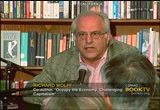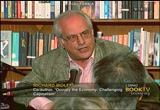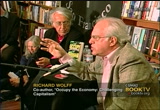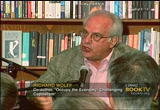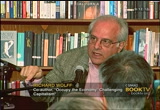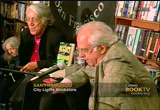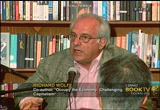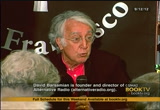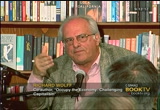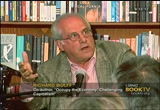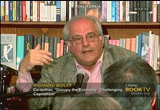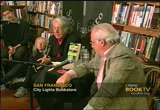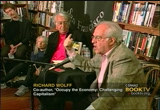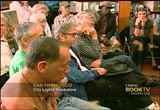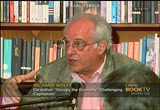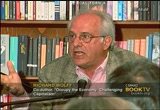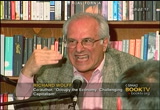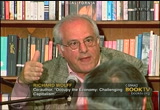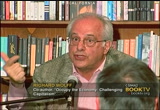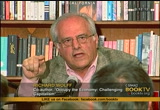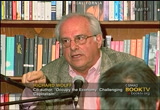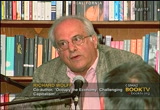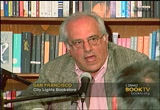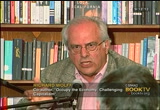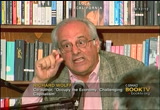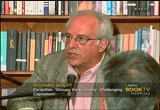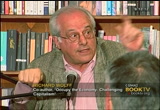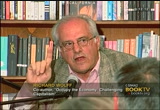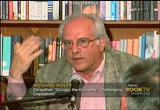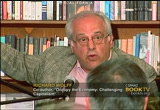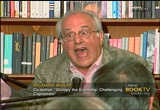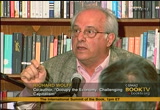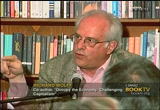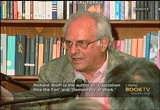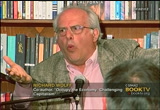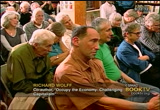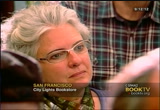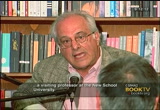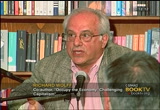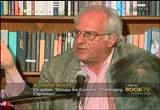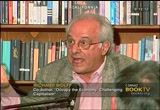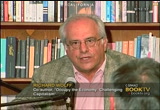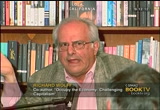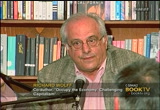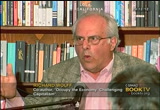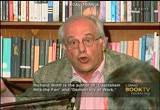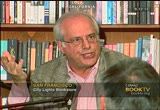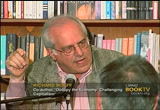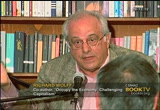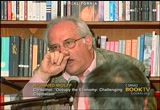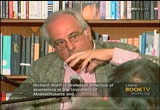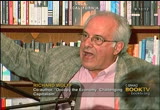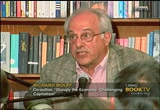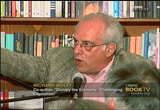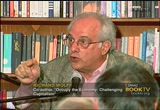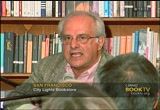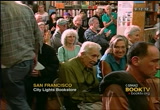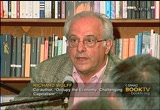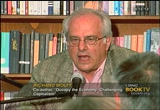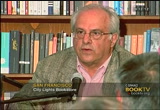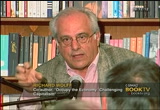tv Book TV CSPAN December 29, 2012 10:30am-12:00pm EST
10:30 am
in little america of the war within the war for afghanistan, washington post senior correspondent reports on the military and government failings in the war in afghanistan. nancy gives him an editor at large and michael duffy, executive editor for time magazine chronicle the relationship between the u.s. presidents in the president's club in side the world's most exclusive fraternity. political commentator kevin phillips recounts what he believes was the most important year of the american revolution which was 1775, a good year for revolutions. for an extended list of links to various publications, 2012 novel book selections visit the book tv website, booktv.org or our facebook page facebook.com/booktv . >> up next on book tv, richard wolff and david bersamian talk
10:31 am
about our economic crisis and argue that it can be traced back to the 1970's when our economic system shifted from benefiting a vast majority of americans to one which mostly benefits only the very rich. this is about an hour-and-a-half. [applause] >> good to see you will hear. let's cut quickly to the chase. what is it and the dna of capitalism that makes this so unstable? >> since the beginning of economics as a discipline back in the days of adam smith and david mccarty who were the first to develop it as a comprehensive way of thinking about things, economist of worry about that. it has never been, except maybe in the last 30 years, the case that a significant portion of
10:32 am
the profession, let alone the public imagine that capitalism was anything else. the reality has been from the beginning wherever capitalism has established itself, it has been stunningly unstable. it is all the time facing three to seven years of economic downturn. give you an example. the last time we had a major collapse of the size we have now was in the 1930's, as you all know. there we had a collapse beginning in 1929 that wasn't done until 1940-41, of very long time. unemployment rates, much higher than we have had so far in this one. so that's a terrible disaster that puts people back in this country very far. cut back production, imposed poverty and a skill we have not seen before. you may not know that between the end of the great depression
10:33 am
and the beginning of the current disaster which is dated december of 2007 in a month there were 11 more economic downturns. in other words, the system is unstable in an extraordinary way . every few years millions of people are thrown out of work. huge numbers of businesses collapse, immense amounts of production that we are capable of producing is undertaken. people without work sit side-by-side with unused tools, equipment, raw materials. it is a catastrophic problem. i like to explain this to my students. as a bill the potential nine have a pregnant pause emmeline across the podium and said to them, if you live with the person as unstable as this
10:34 am
economic system you would have moved out long ago or demanded they get professional help . it used day in an economic system without the same or comparable reaction. so it has been clear, even from people who like capitalism, that this is a major flaw, a major weakness, a major cost, and they try to come up with explanations so far as the explanations have not led them to the solution. i want to stress that in response to david's question. for example, since the great depression where our president was franklin roosevelt, every subsequent president has had the unfortunate need to cope with an economic downturn. that's what it means to be the president of an unstable system. and every president has made the same promise, starting with
10:35 am
roosevelt and including mr. obama. if you will just follow my policies, these presidents have all said, not only will you get out of the current economic mess , but we will thereby make sure that this kind of economic crash does not affect our children. every president has promised it, no president has yet delivered on a promise. everyone has failed. we cannot control the. from monetary policy to fiscal policy, the federal reserve, stimulus program. we were not supposed to have this crisis. when it began to be clear that we are heading into a real doozy we were told by mr. bush and his advisers that it was just in the housing market and the sub prime mortgage and it would all work out. nothing to worry about. the federal reserve has just
10:36 am
decided on the quantitative easing program number three. the only reason they're pumping money in for the third time is because the first to didn't work the reason you had to have multiple stimuli was because they didn't work. so it's a very stable -- unstable system. it is not clear what that is about except that it is very deep, built-in, and the reason we know that is every effort to stop the, to prevent it, to not have it affect us has failed. and if you ever wanted, not that it is the only one, but if you ever wanted one way into a conversation that would question a system that displays that kind of instability because you cannot exaggerate the cost. every index of missouri goes up with unemployment. mental health problem, physical health problems, drug addiction
10:37 am
come out all wasn't, break above family from alienation of parents and children. you name it, it gets worse with economic downturns. fairly obvious reasons. the costs are spread into the future. the children of parents who are unemployed, one or the other who live in a community afflicted by and foreclosures. those children show their scars in their educational development of personal development and emotional development for years to come. every time i hear some conservative politician explain why we have not got the resources to do something about unemployment, another one of these economic downturns of capitalism to lyle was scratched my head because even the most conservative calculation would indicate that the cost of not doing something is larger. ought to have been undertaken long ago. just as in this case, the most stunning thing if you are a
10:38 am
normal thinking person would be to ask yourself, the last time we had a crisis like this, the last time capitalisms and stability took this terrible turn in the 1930's something very different happened then is happening now. major steps were taken by a democratic president's, middle of the rover, mr. obama, everything changed and he wasn't a big middle of the road. he became something else and a lot of things for the people. none of those are being done now that is a remarkable difference in the way you handle the system is instability fought long ago ted made it necessary if we were not a society that was afraid of them to ask the question, can't we do better than an economic
10:39 am
system that regularly relentlessly imposes economic downturns on us? timing, that said. we would have to accept this as if it were rain on a rainy day instead of saying, it's a strange society that would have an economic system performing like that and not ask that question on a regular basis as part of the basic question of how to do better in a community that to have an economic system that works like that. >> the political class in washington responded to the economic crisis? >> well, i will try to be polite. we have not only an economic system and capitalism that displays this stunning instability. we have an economic system that has other qualities that i think
10:40 am
are equally important in shaping my answer to what the political class is or isn't doing. we have a tendency in capitalism to polarize and come. in other words, the interaction of production and markets, the way they normally work gives all kinds of advantages to people who have assets and produces a look and the disadvantages for people who don't. when you can compare your own opportunities to those two have already had a good ones and have accumulated something, you understand even if you don't go through the mathematics that the system tends to produce inequalities of not come. the best example would be a last 30 years, a stunning time in which the gap between rich and poor has become much more extreme in the united states that it was 30 years ago. if you compared 30 years ago
10:41 am
here as opposed to the countries of western europe, we were the most egalitarian of countries. now we are the least. we have outstripped everybody else because our capitalism has been a relatively robust. when capitalism can do it's thing, it polarizes. when it polarizes it creates an awareness that is probably also occur to you. if a growing number of people i'm having a hard time and a shrinking number of people are collecting enormous wealth, it will occur to the two of them that this is happening. and in the one group there may develop their resentment against the of a group. and if you have a system like capitalism coexisting cannot that you have to, but if you have a system of capitalism coexisting with the democratic society in which everybody has the throne and the following in sight is going to occur to a lot
10:42 am
of people. we, the majority, are really getting screwed in the economy. the way to fix it to reverse it, to offset is to use the political system to get the result. in the political system weekend rearranged so that what we lost in the economics as it became more and more unequal is recouped by using politics. the majority votes, the majority rules, this is a perfectly logical way of thinking. this has occurred to the rich as well. and to the corporations as well. so the more of the system produces the inequality, the more urgent it becomes for those benefiting from the inequality of capitalism to control the politics. because the alternative would be self-destructive. or not going to do that. not going to allow a political system to function that and does
10:43 am
what they have achieved in their minds in the economic systems. there not going to do that. and so you can watch as america becomes more unequal that it becomes necessary for the politics to become more and more dependent on the money, dependent on the corporations to provide contributions to the candidate, the party, and more important than those things, the army of lobbyists to shape what goes on in the normal business of government as, perhaps the most important, all the think tanks, all those apparatuses that go around shaping how we think about the problems of the world, what gets in the media, the newspaper. how we all normalize with the great tourist years ago called the shaping of common sense, what becomes the common-sense notion is not a neutral matter. it is not just blow out of the year. a lot of time and effort is
10:44 am
spent by the people who run the society to shape the common-sense notion. i think we have a politics that has adjusted to our economic system, as we should have expected it to do all along. those folks are not going to permit as much as they can, not going to permit the political system to undo the results of the economic system with which they are quite pleased. as long as that happens you, i, and the american people in general are going to confront a political system very nicely articulated to oscillate between two parties who have differences, but whose differences are not about the basic economic system. either one of them has the slightest interest in debating it, let alone fundamentally changing it. and that is, therefore, fine. for those who run the society it then becomes a coin toss. do we like mr. romney,
10:45 am
mr. obama, prefer the republicans and the democrats. for the mass of people sent the system cannot be debated because everyone agrees, then we focus elsewhere on things like whether you can have a gun in the back of your truck or whether you can approve of being marriage or a whole host of other issues whose importance on not disputing, but are issues that get us away from this thorny problem of how the economics and politics are articulated where they're is a desire of those who run the society that that simply be ruled out of order. >> the corporations that dominate what most people in this country see here, perfecting the art of propaganda and manufacturing consent well simultaneously criminalizing dissent. i want you to talk about the very origins of this which could
10:46 am
be traced to the much revered and in my view much overrated founding fathers, the political rally. people talk about them in hushed tones. let's hear what they have to say about these kinds of issues. james madison who wrote with hamilton the federalist papers, principal writing of the constitution set straight up to now the aim of government is to protect the up and let minority against the majority, to protect the opulent minority against the majority. and his colleague goes one step further. the first president of the constitutional. he said only -- those that on the contrary to government. the origins of this kind of a monopoly capitalism go back right to the very beginning of
10:47 am
the country. >> the system does some of its sharpest analysts and critics have always understood, is full of contradictions. it is important that i be understood not to be arguing because i don't believe it. this is a system, for example, the likes to call one-dimensional. somehow solve its problems and presented a united face that cannot be overcome, that cannot be tracked at the system, not so well defended that any hope of changing it is delusional. and a bully the for one minute. this is as simple of all kinds of problems that it cannot solve , and it is patently obvious. i already mentioned one. it does not want these crises. these are kinds of trouble. in times of crisis people are
10:48 am
asking questions which gives opportunity for people like me to offer unusual answers. this is not useful. it's very important. another example. the worst conceivable thing from the republican party and george bush going into the years 2007 and eight west to end up having to run the next presidential cycle at the moment of severe economic crisis. they did do everything they could think of the mire of the best economist, pay them a fortune of money from a pull out every stop, get every corporation to help every way not to have that happen. mr. obama was able to ride into office on the anguish of the american people who blame the republicans and mr. bush. the republicans are now busily trying to return this favre and
10:49 am
run the game the other way which is the way this is all done. mr. obama did not want to enter the race in 2012. a disaster. the biggest endangerment his campaign faces. and so clearly. the idea that it is all under control is, i think, not only in the state, but in a state that is suggested often in academic and media circles. i am a professional economist. i have been doing this all my adult life. a professor of economics. as our friends and associates we all agree that this is the worst condition of the american economy in the of a stalling have never seen but ever imagined could happen. we disagree on what to do.
10:50 am
it is a disaster of unparalleled proportions. there is no debate at all. even those that are on the pay a political parties will in private say that. there is no question that controlling this economy has worked. it is in many ways out of control, and that creates opportunities for critics and folks who want to change things. they should never forget that. >> occasionally with the cat out of the back. what is sectional -- his secretary pays more taxes than he does and acknowledges that class war is being waged and that this class is booming. rather remarkable. i want you to talk about events and the eurozone, europe and how
10:51 am
that is affecting the economic crisis here. your visit, an example of successful example of an alternative to of the capitalist economic model in spain. >> first of all, warren buffett, there again i think the contradictory as of all of this is at play. on the one hand, yes, there have always been people like him on the side of the wealthy, the big corporations, who have a clear understanding that at a certain point it becomes dangerous to keep going in that direction. you cannot keep having a smaller and smaller number of people doing really well in a sea of people that are having a harder and harder time. pushing, but don't kill the goose that lays the golden egg in the end. so there are always voices like
10:52 am
that. not the only one. there are a whole bunch of people like that to see that and to have the courage or the comfort or the security to say it. remember also, the same warren buffett he says that is a major owner of the moody's corporation , and the moody's corporation was a central player in providing aaa ratings for securities we now know were worthless, are worthless, fraudulent, and someone. and so, you know, he is as he would himself admit a part of the system and therefore draw and to many of the activities that actually brought about the very crisis seen no worries in terms of its consequences. let me turn to europe. here we have to be a little bit careful. this crisis is some ground.
10:53 am
this is an american crisis. it blew up here in 2007, 2008, 2009. it was much worse here than anywhere else in the world. the europeans looked at the united states, thank their lucky stars that it was not so bad there as it had been here. this was a mistake of the europeans. they thought that this was a crisis peculiar to the united states, peculiar to housing or to mortgage finance housing, whether stories they told themselves, stores and were told here in the united states. the very term that is still used, financial crisis as if it were limited to the financial sector which is the only function i can see for that adjective to call everybody sort of like police departments who announced that literally every
10:54 am
crime is drug-related in order to come for all those people who might be worried that if it weren't in it might be part of the normal lives they lead, which we don't want. so financial crisis limited. it is in the financial crisis. it's a general crisis. it is an american to make its global. financial, its total. everywhere across the board. we can talk about that more. europeans have found that to their great dismay because once it had begun to be a little bit moderated here, 2010, it erupted in europe with all the force of a crisis that had been postponed like a disease. and then when it finally arrives because he did not take care of the years earlier, it's worse until the europeans in the last two and a half years have suffered the more extreme experience like the united states had earlier.
10:55 am
this has led americans to play the same game to the europeans that they play toward us. we have it under control. we have all long road to recovery. i hope many of you know this. the word long was repeated. foreshore it is a long road since we are nowhere near the end of it. there is a sense. to you get bizarre formulations. i give you one example. europeans are in trouble because they're trying to preserve a kind of a vanished social democracy, a kind of safety net, i kind of welfare system which the world can no longer afford enviously europeans have been appreciated that now are paying the price. the details, the following. europe is very different.
10:56 am
coming through this crisis very well. germany, for example, is doing much better than the united states. the employment has shrunk to the last few years. basically cause the entire crisis. we began at about 5%. we went up to 10% in vietnam at eight and a half%. does not a recovery at all. the germans a doing well. they have one of the best safety nets in europe. there provision of services for other people has not been icons of their having a hard time. the other parts of europe that are doing quite nicely as scandinavia. famous for the quality and quantity of their safety. the idea that european problems because they have the sickened at requires you not to know much . the store. having said that, the crisis is
10:57 am
very real in your, and i would urge all of you to pay attention because europe is a very, very important player in the world. in many ways the number one player. but if you take that european market together more people and more product. that is a very important part of the world economy, as important as the american states. also the place in the world that has had more violent warfare among dismembers over the last century than anybody else. two world wars of stupefying destructiveness and is therefore confident that is devoted to trying to do something about the severe anxiety a half just to raise an issue that you might want to debate at some point.
10:58 am
mib a connection between capitalism which has been the dominant system over the last century and the scale of warfare that is mind bending at the same time. put that issue aside. the europeans are terrified. they have tried to build unity, a unified society, a united states of europe in the sense. in some ways modeling themselves on the united states. having now common currency, euro and the european commission and the european parliament moving in that direction. they are now facing an extremely dangerous situation. one part of europe is doing very well. germany, france, northern europe, generally speaking. italy, spain, portugal, greece and ireland, hungry are in terrible shape.
10:59 am
serious terrible shape. and because some folks don't pay attention to numbers, here's a chance for a statistic to help. students of mine, professors who came to the united states to study the universities where i taught. now professors at the university of acton, major universities increased. today their salaries as we speak are 40 percent less than what they were in may of 2010. try to imagine yourself in a job that you've kept in which the money you get every week is 40% less. police, fire, school teachers, social workers, you name it. ..
11:00 am
governments in france and germany have been very frightened since they too are facing an economic crisis and they too are trying to solve it by making demands of their people to pay for something we come in to. they have chosen to use a very dangerous strategy particularly warm germany and the strategy goes like this. we the government are your friends, you the german working-class, because we are not going to allow you to be
11:01 am
made to pay for those lazy southern european people in greece, spain, italy, all those places where they have vacations. we won't. then they play a kind of nationalist almost quasi racist card, trying to be the friend of their own workers because the german workers are worried about the austerity, that is what it is called in europe, coming down on them. they see it coming and they are very nervous because angela merkel in germany, the conservative government and nicolas sarkozy in france, the former conservative government where people who believe in protecting the capitalist system by bailing out every bank and big corporations the way we did here, doing that by borrowing money and then paying of these enormous debts by laying off public employees and using the money used to dig them to bar of -- pay off your borrower.
11:02 am
the strategy everywhere. the germans and the french workers are worried so this neutralized them by saying don't worry, we won't do it to you because the issue is we are not going to hurt you because we won't leave you to pay for those spend ridge greek or spanithrif italians. very dangerous. they already have many -- house of for this nicely -- mixed fox about their fellow europeans left over from the war. those are being rekindled on a scale that should make everyone aware of the recent history. you can already see the signs of severe conflict in europe which i notice in the american press systematically underreport
11:03 am
ridge. greece and france, one in terrible shape and one in pretty good shape. increase we see a political reaction to the economic crisis of monumental greece we see a p reaction to the economic crisis of monumental proportions over the last decade, greek politics is like republican and democrat, one with the democracy party and one was the greek socialist party. they would alternate. every few years they would change seats and the red hats would be replaced by the blue hats and all the rest. this year everything in greece changes. after the crunch down on the greek people, making them pay for a crisis they had nothing to do with, making them a for
11:04 am
bailing out the richest folks in greece, etc. the greek people did what no one thought they would. in the last two elections, a majority of greek people did not vote for either of those parties. try to understand what it would mean if a majority of americans voted for night of the republicans or democrats. in the last election the two major parties of greece, new democracy and the socialist party together got under 40% of the vote. and the explosive new party is a party that is a far left wing party that is against all austerity programs and wants to solve greece's problems by taking wealth away from the traditional greek ridge. this is a party that until this year didn't get more the 2% or .
11:05 am
this is a party that until this year didn't get more the 2% or 3% of thech . this is a party that until this year didn't get more the 2% or 3% of the. this is a party that until this year didn't get more the 2% or 3% of the boat. the government agrees -- there's a lot, under greek law whatever party comes in first, take a step back, greece has proportional representation that deserves a word of comment. proportional representation is the peculiar idea that if you get a certain percentage of the vote in an election, you should have the same percentage of delegates in congress that right the laws. it you didn't do that you exclude the 18% that had a role to play in governing which you
11:06 am
think is the idea. in european countries we have proportional representation. if you get more than usually a cut off of 5% to get whatever the percentage of your vote is that is how many seats you get. you all understand i assume we don't do that in united states. if you get 51% of the vote you get it all and 49% wage. we have had proportional representation in the united states in the past. when you read about primary, and they a gets 20 delegates for the convention and candidate b, that is proportional, they get an equal number of delegates, we actually recognized in the united states proportional representation, we just don't allow these days in our elections. one reason for that if i can be allowed a moment of american history, finding myself these days teaching american history
11:07 am
over and over again and here is an example. you may not know it but in the 1940s, the city council of new york city had elections based on proportional representation so you would get a seat in the city council of new york if you got x% of the vote. if you got twice that you would get two seats which is how the following happened. amen named ben davis, benjamin davis won s c and city council of new york in the 1940s. you might be interested in two aspect of benjamin davis, city council member. he was black. he was an african-american and he was an enthusiastic public leader of the united states communist party and he was
11:08 am
elected because of proportional representation. shortly after that proportional representation was ended. new democracy came in first, they had twenty-eight%. ari arizahad 24 or something close. under greek law whatever party comes in first gets not only the percentage of the popular vote that is won but an extra 50. that is the only reason there the government in greece now because they got it by this rule which is designed to favor the party that comes in first. you had a knife edge situation in greece. in addition to the sariza party their deep rooted greek communist party that got 8% of
11:09 am
the vote typically so you have 24, one third of the voters in greece voted extreme left wing hostility not just to this crisis but to the capitalist system of greece and they don't make any bones about it. that is a sign of change, of a reaction to the crisis that is taking form that you will not hereabout and i will leave to your imagination why that might be. france have had three elections this year all of which are notable. in the first election for the upper house of their national parliaments called the senate like ours, the socialist party won for the first time in half a century, always controlled by the conservatives, the socialists won. a few weeks later was the election for president. nicolas sarkozy was bounced out
11:10 am
after one term replaced by france what holland -- france what --fracois hollande of the socialist party. for the first time in many decades the entire french government is controlled by the socialist party and the socialist party ran on the following platform -- austerity is not tolerable. we cannot allow the french people to be required to pay the cost of a capitalist system that could not solve its problems. the first two commitments of the new government were to raise the income tax bracket on the highest earners from its current rate, 45% compared to the united states which is 35%, raise it from 45% to 75%, and that has
11:11 am
been passed. it past the parliament because the socialists who proposed it have the absolute majority in all the houses and the second thing was to use some of the money to be brought in by taxing the rich to higher, which he has now done, 40,000 new school teachers across france. these are symbolic acts and the fight is far from over. the wealthy in france are up in arms about this and all kinds of struggle and it is not how -- not clear how far the socialists will go but the writing is on the wall. europe, unlike the united states, unlike the united states never allowed the waves of anti communism to decimate the
11:12 am
organization that had built up their left and during the great depression. we had in the united states three organizations in the great depression that changed everything. the c i o, industrial organizations, organized people into unions in a way that we never had before or since. that was the greatest wave of unionization the united states ever seen. in the depths of the depression. think about the difference between then and now. in the depths of the depression millions of americans decided they wanted to join a union and they did so on a scale we had never had before or since. the second big organization was the socialist party's and the third was the american communist party who were coordinated with the cio and the joint membership and so on. very powerful organizations parallel to what you have in europe but after the war
11:13 am
everything changed. if i could take a moment to explain why. roosevelt comes to power, the depression is underway three years, he runs on a balanced budget proposal, he gets into office and everyone tells him the economic crisis is worse than anything they have ever seen which is clearly true. they don't know what to do and it is getting worse. something has to be done. this might have been an interesting conversation but there are also people marching in the streets on a scale we have never seen before because of the cio and socialists and communists to rally unemployed people, took over things, struggles in the midwest that some of you know about, when militias were organized by farmers who informed judges in american courts that if they through any other farmer out of
11:14 am
his or her home because the mortgage problem they would lynch the judge which they did repeatedly and roosevelt had to call out the national guard who sometimes won but only sometimes. this was producing a tinderbox so that finally went the socialists and communists said you have to do something, you must do something, they knew they had a political problem on their hands. first the c i o was representing tens of millions of aggravated energized workers in unions but the socialists and communists who had become very strong represented something scarier which is a different system, not a demand for help but different system so roosevelt acted. the story i am about to tell you is basically what he did. he went to the rich and corporations. people he knew real well because
11:15 am
that is where he came from. well-connected family. he said to them you have got to give me a lot of money, really big, because i am going to have to take care of all these people you have unemployed and i tell you you had better give me the money because if you don't, the socialism and communists coming down a road will cut you a lot worse. here it is. these mean a lot. they agreed. the other half never did. they committed themselves to do something i will mention to you in a moment. the half he won over wasn't enough. he went back to the unions and the socialists and communists and said we have got a deal. i am going to take care of the desperate people in this crisis on a scale you never dreamed of
11:16 am
the. you won't have to pay for it. i will get the rich to pay for it but you have got to drop all that crap about another system. you have to leave the corporations the way they are and let shareholders hold the shares and led and select the board of directors, led that be. that deal was struck. the word -- there were dissenters but the deal was struck. roosevelt goes on the radio and says hello, of americans suffering from depression. here is what i am going to do. i am going to create a social security system. we never had that before. every one of you who has done a lifetime of work and is 65 years of age or older, i am going to give you money for the rest of your life. every week or month i am going to give you money.
11:17 am
people couldn't believe it. try to think. old people were in deep trouble. there were no pension in those days. they had nothing. if they had anything, kids had no money to help their elderly and were caught in a horrific squeeze of sacrificing their own parents versus their own kids and all of that. terrible situation. and another great idea. it is called unemployment compensation. if you lost a job through no fault of your own i will give you a check every week for a couple years. then the third one, almost a quote. if the private sector of the united states cannot provide work to the tens of millions of americans who want and need it, there is no alternative. the most natural thing in the
11:18 am
world, no alternative but the government has to do it and we shall. from 1934 to 1941 depending on how you count he created somewhere between 12, and twenty million jobs in the united states. how was that all paid for? remember where we are today. we have to tell old people they have to wait to get social security for another few years and we can't have the garbage collected all that many times. let's have the truck come around once a month whether you need it or not. there is no money, there is no money. that was the worst depression, of course they had money. they did all these things. where did they get the money? and the only place they could get it. they would have to tax the rich and the corporations. that is not a fanciful left wing idea. that is an american historical
11:19 am
reality of our own past and how it was done. let me give you a couple numbers we economists like to pepper our talk with numbers because it seems to be effective in getting people to believe us more than if you didn't throw in the numbers. here's the number. 1943, it is the war. president roosevelt those on the radio and says to the american people it is impossible for me as a president to sleep at night. we pay our soldiers who are over there in europe $600, that was what they paid a year to risk their lives and they were dying in huge numbers. at the same time we have people in america earning while the amounts of money so i am going to propose the following income
11:20 am
tax rate on everybody who ends over $25,000 which was a helluva lot of money than. here is the rate the president proposed in his message to congress, 100%. i didn't make this up. 100%. glad you are enjoying this. if we can get more americans to enjoy this, then there going to change. this is maximum income. that is what economists mean, it meant every dollar over $25,000 you earn that you didn't earn. you would have to pay it in taxes. i did the numbers. $25,000 then, $350,000 now. every dollar over 350 today, good bye. the republicans as you might imagine, then and now, went ballistic with such a suggestion.
11:21 am
they hated it and there was a tremendous struggle and finally compromise was reached. the compromise was 94%. those starting -- yes. smile. this is american history. i didn't make any of this up. in 1943, every dollar anyone in america earned over $25,000, he or she had to give $0.94 to the government and they got to keep $0.06. ninety-four% top income-tax rates for those people the top rate is 35% but now you can see how things have changed after the war compared to what they were, by the struggles of the 1930s. when someone says is it worth it to struggle to build the
11:22 am
socialist party? i think the answer is self-evident. look what they were able to do. in 1945, the federal government which relies overwhelmingly on the income-tax, income tax on individuals and the income tax on corporate profits, individuals on their income, in 1945, for every dollar the federal government got from individuals, got $1.50 from corporations. today for every dollar the federal government gets from individuals it gets $0.25 from corporations. over the last 50 years, taxes were shifting from corporations to individuals and from the richest individuals to all of you so on behalf of america's corporations and wealthiest people i want to say to all of you, thank you.
11:23 am
very kind of view. so what is the great tax problem we have in the united states? we don't have a tax problem. we have a political problem in that we are incapable of the mounting the kind of campaign to go and get the money where it is and where it has always been and where it was in the 1930s and where it was taken from by mr. roosevelt to get us through that crisis with a lot less suffering than would otherwise have happened then or that is happening now and there we are back to europe where the europeans are saying we will not tolerate this. over the last few years this issue has become tight in europe. my guess is we are going to see the ramifications of this as europe is literally torn apart
11:24 am
with inculcation, reverberations in our society that will touch everyone in this room and everyone watching. >> we want to get to some of the questions from the audience but i won't let you go without talking about the possibility of a successful cooperative year in the united states as an alternative to corporate capitalism. >> that is a wonderful question. let me give a context. what was done in the 1930s was this deal i described, to leave the corporate capitalists pretty much alone, help people with social security, unemployment, jobs, but don't change the system. we have had 50 years to see what the results were. i think the results are clear. we have lost what was gained
11:25 am
then. for example the tax rates that are described to you have all collapsed. rich people don't pay what they once did. corporations don't pay what they once did. when a comes to regulations passed in the great depression, very similar thing happened to this one, the banks were a leading cause of collapse. go back and read your history, there were things called bank panics and bank holidays where people would be told your bank may never give you back the deposits and people would literally run to the bank hoping to get their money out before the window was closed. the government had to declare bank holidays, closed the banks to prevent pandemonium and so on snowbanks were seen as a problem and a famous bill was passed in 1933 which said the following. banks have behaved badly.
11:26 am
this may come as a shock to some of you. the banks be a very badly. they took inappropriate risks for other people's money, depositors and individuals took their money in for safekeeping and so on so a bill was passed that said we have to have two kinds of banks in the united states, depository banks which accept deposits and not allowed to take any real risks and a separate kind of bank, an investment bank, banks like goldman sacks, collect money from investors and take risks, because investors know what they're getting into when they give these banks some money. this bill was inconvenient. they wanted to use other people's money because that is how they made money. they went to work after 1945 to evade, week in and get rid of this bill.
11:27 am
it was named after the two people in the senate and house and pass it, mr. glass and mr. siegel, the glass-steagall act. in 1999 basic seated, they got the bill repeals, and the repeal for those who don't know was signed by bill clinton as president. helping to deregulate. what did we have? the taxes on the rich were gone ridge of, taxes on corporations were reduced, regulations on business were gone ridge of. what is it we saw? we saw that by not changing the organization of capitalist enterprise, we left in place people with the incentives and the resources to undo everything that had been achieved in the great depression. we learned a powerful lesson.
11:28 am
it is like winning a war but leaving the enemy with other armaments. they might use their weapons to try again. if you leave in place a corporate capitalist structure, a small group of major shareholders will own the shares in their hands. d. a. therefore select the board of directors and remember what a board of directors does in every corporation, it decides what to produce, how to produce, where to produce and what to do with the profits. for americans this struck a moral political issue. we are in a country which claims it is committed to democracy.
11:29 am
we say that about our political activities and here we are, we go to work five of seven days a week working all day in a workplace. workplace where decisions are made all the time which affect us. is a workplace democratic? do we participate as workers in deciding what we produce, how we produce, where we produce and what is done with the product? i rest my case. we don't. the place we spend most of our adult lives is not democratic, which makes our commitment to democracy wobbly to be as polite as i can. beyond that, we have left in the corporate board rooms people who are determined to undo everything that was done in the great depression. the job of a man or woman on the board of directors is to make
11:30 am
money for the corporation. that is why they are there. a high tax rate on big business, they don't want that. for them a tax on their high wealth for, they don't want that. for them regulation that impedes their freedom of making business decisions, they don't want that either so they go to work to get rid of impediments. that is their job. that is what they are taught in business school how to do. why are we surprised that after world war ii they got rid of glass-steagall, lower taxes on business, they don't just have the incentive, but they are the board of directors. into their hands come all the profits so they have the money with which to realize their incentive and that takes us back to where we began. they went to work on politics, to get rid of that bill, to change the tax law. they used the money to control
11:31 am
the politics to undo the impediments and here we are back again. glass-steagall was repealed in 1999. eight years later the banks took us into the soup again. first time, shame on us. we didn't understand we should we did this way. shame on them. second time, shame on us. what do i mean? here is the hard part than may's that some folks but let me plow ahead. we have to face the fact that an undemocratic economic system rooted in the way of organizing a production that we have left in tact has now given us the second major collapse in 75 years. it has undone most of the achievements of the 1930s and it
11:32 am
is now in sufficient power to have made sure that the crisis brought on was responded to by the government bailing out all the folks at the top, the biggest banks, biggest corporations, the stock market. and with all that money sent by the government to bail us out we to realities were left. one, it wasn't enough to overcome the crisis and number 2, the government's probably borrow the money to bail everybody out and that has to be dealt with and the way it will be dealt with is we're going to fire teachers, we're going to cut back on your pensions, we are going to force stocks into bankruptcy, we are going to force teachers in chicago out on strike, and so on. a system produces a devastating crisis again, bayles everybody at the top leaving the mass of
11:33 am
people not bailed out and informs the mass of people you get to pay for all this. so the alternative would be wasted -- wait a minute, stop. can we organize our enterprises in a way that would be radically different so that we could make changes that wouldn't be undone by boards of directors? is as american as apple pie and baseball and what ever else you want. it is the old idea of cooperative enterprise. democratic idea, a notion of democratizing the enterprise or the workplace or the economy and the idea is simple. the people who go to work in a store, an office, a factory,
11:34 am
doesn't matter, they should collectively make the decisions of the enterprise. monday through thursday they do whatever their particular test is, friday they come to work to different thing. they sit around all day and have meetings where they decide what to produce, how to produce, where to produce and what to do with the profits. was an interesting idea. think a minute how it might work and are will give you a concrete example how it has worked. for those who are skeptical you will see i didn't make this up. i am not clever enough. what to produce. workers would be participating in deciding what products to produce. what an interesting idea. how to produce. here is a thought. now accompanied decides to use a toxic chemical.
11:35 am
the board of directors in new york city, the knows where, looking at the bottom line, this is a good chemical. it happens. if you have people mmical. it happens. if you have people making the decision, you will probably reach a different decision about that toxic technology. how it is being produced, letting people make their decisions makes quite a difference. this gets done now. where to produce. of the workers in every enterprise made a decision where to produce, how many would close the factory and move to china? i would guess probably non. close to zero. what of thought, that the workers who had to live with a factory that closes, live in a community that will be affected
11:36 am
by factories the close, and workers themselves make the decision. here is another one. for chris decide what to do with the profits, here's an interesting thing we expect. over the last 30 years with boards of directors, we have noticed something i am sure you have all noticed, the boards of directors decided to use the profits they were earning to give enormous increases in the salaries to top executives. we are famous in america for that. thee aratio of one executive ge to an average worker is 300 to 40s all other countries. so we have been in a major part of the ineq0 lity that i talked about before that has grown up in 30 years comes out of the decisions made in the boardroom with the boards of directors and
11:37 am
mothor shareholders about the profits. if the workers themseffeces distributed the profits collectively, would they give poor people $4s every body else says not enough? unlikely. the biggest, best way to undo the inequality of wealth in the united states would be to reorganize a decision about how profits of corporations are distributed. if you are serious about doing something about inequality, here's a good way to start. i could gone and as you can see i enjoy the process but i won't. a place that has been doing that, just so you all know, a small pe when i make this argument i sometimes get skeptics whoe arae their hands, that is all righy we all know about -- run this way for those not aware of it,
11:38 am
also true of the yellow cab co. and some other insti300tions in this area. and interviewed the other day, works in -- in 1974 a collective enterprise. there are a little places you can do that with six people if they're not too weird, but you could never do it with -- always struck by that and here again i am going to be my economic profs self. i had to teach and learn in courses called economic history where we discuss how feudalism in europe, which it been there for a thousand years gave way to capitalism and here is something any historian knows, in the
11:39 am
bedisnning as f tedali1 o c was falling apart, all the early capitalists were small. won business man or woman with three or six workers. capitalism which became dominant and blve t f tedali1 o c of the water started small. when i tell you workers ruto thut that is not an argument you have to worry about. is how it normally goes. you start small. the f1 o lestion might arise can you become big? a city in northern spai. if just below the pyrenees mountains that separate spain and france. inins956 as one of the legacies of the spanish civil war that some of you know abouy e terribe poverty, suffering in that part of spain, it is unique because
11:40 am
it is a spenarate lang0 ge grod different ethnicities and spanish people, and so forth. a catholic priest in that part decided to do something about the problem of unemployment. and to help you understand something, they chose the name in honor of what i am about to tell you. father arizmende , the town has two names, a staranish name and basque name. he took six workers and staousd a cooperative enterprise. 1956 is when he began.
11:41 am
very clever. he did it intermountain area with a spanish government because the basf1 o le people fig arguing guerrilla wars. the spanish government keeps distant from them because it tried to control them many times and was never able to do it. they had the protection of the mountains and their long history of gve trrilla fig arguing and protection that the catholic church was n tetralymed becears it was half of a catholic project. the montalban corporation has done well. it now has 120,000 employees. it is the seventh largest corporation in all of spain. it is the largest corporation in the northern part of spain their runs from barcelona in the east to san salvador in the west. is an extraordinarily successful
11:42 am
collection of 300 co-ops, some as small as a dozen people, some numbering employees in the thousands. the largest single enterprise is the largest supermarket chain in the northern half of starain. with tholhu00 employees, those supermarkets are run as cooperative enterprise. all decisions are made to get the. they are highly modernizee of highly technologically efficient and they have a n. wber of interestinge arules but before mention those, everyone of the courses is ref1 o lired to compete with capitalist enterprises and whatever they do and they do everything from rap that farming to the production to high-tech equipment of all kinds. they have their own bank, their
11:43 am
own pension system, and talianagement. when you arrive there, big modern glass and steel bpetldings, you thihate you're walking into an american corporation headq0 ous ers outse new ng hrsey, manielfred bushesd lawns and everything looking starecific. amazing what they have achieved and here are their rules. hy bottom line is the job.
11:44 am
they will make sacrifices to keep working. if they can employ you in this cooperative, the parent will give you a menu of options of where else they will relocate you with whatever training you need because for them, their job and what it means to the community and family and all those who depend on a job for a person is number one. spain is a country today who the official unemployment rate is 25%. the rate it was at the depths of the depression, 1933, you have all of spain in a 25% unemployment rate among the people, nobody loses their job. that is the commitment and they have been able to do that and most proud of. can you become big?
11:45 am
can you succeed? can you do many of the things -- did they have lots of problems? yes. all kinds of problems. no one should think this is some sort of nirvana. we have been through enough in the last hundred years. working together collectively have lots of problems. you may know that from personal relationships and family and special cases. i am first to tell you they are careful and defensive. when i asked how the religious political parties in spain they all smiled and say the beekeepers are away from them, nothing to do. their sense is parliamentary politics is a hornet's nest of
11:46 am
trouble and corruption and even though -- very obviously on the left but they want -- kerri stunning example. not that you have to go to other countries. cooperative enterprise. let me urge you -- embarrassed that i have forgotten the title. san francisco and berkeley, a new edition came out this year of the history of cooperative enterprise in the united states. it will amaze you how much our history as a nation is wrapped up with people who came from all over the world with all kinds of experience they brought them in collective or cooperative or community enterprise.
11:47 am
to drive it home, the knights of labor, the forerunner of the afl-cio, a two pronged strategy for labor and it went like this. one thing that we do is help workers negotiate a better deal with the employee, better wages, better working conditions and all the things we are familiar with that unions do. that is the defense of goal. we also have another thing. and it gets beyond being dependent on the employer. and that brings the organization and building, prevent cooperative noncapital list enterprises where there wouldn't be a few people who are employers and everyone else was an employee. that was defeated at the end of the nineteenth century.
11:48 am
the afl-cio gave up on that. two years ago something remarkable happened. in major american union, the steelworkers union, signed an alliance agreement with montr o montregon corp. and announced they would now explore steelworkers in the united states, whether they might once again begin to think of a strategy in this country in which unions not only fought a defensive battle to help workers collectively bargain with their employers but also begin to organize, support, gather money for the development of an alternative enterprise. here are some thoughts for you to think about. imagine the union that was confronting an american employer who said you have to give me
11:49 am
concessions, want to take back the pension, charge you $60 a month for parking your car in the lot over there and if you don't do these things i am leaving for china. imagine the union desperate and terrified of calling the bluff, in case it isn't a bluff, imagine a union that said to the employer not only is that an awful thing to do but we have news for you. if you do, we are going to take the workers left behind and we are going to produce a company that will compete with what you do in china with the following difference -- we will make sure all the american public knows exactly what happened here and we are going to buy what we produce with those workers here. american unions are going to have the new extra card to play.
11:50 am
[applause] imagine a labor movement that started a social movement around this, recapturing the rule labor once had in the vanguard of social change and in case you are wondering this idea has already produced results. just one example, italy. italy has a book called the markkorah law. in italy if you're unemployed the government gives you a choice. you can get a weekly paycheck like we do here, unemployment compensation. choice number 2, the italian government will give you your entire two to three years of weekly unemployment checks up front as a lump sum on one condition, you must get at least ten other workers to make the same choice and that money must be used in italy.
11:51 am
to begin and operate a collective enterprise of those unemployed workers. what is interesting, how to solve unemployment by creating a new kind of enterprise that would give the american people real freedom of choice. you want to work in a top-down hierarchical capitalist enterprise or try this other kind. would you like to buy the product of these kind of capitalist enterprises or would you like to buy the product of an enterprise where workers have a completely different life and relationship. these are new directions that come out of the crisis of capitalism and turn a bad thing into a good thing. that is the direction we ought to go. thank you. [applause] >> a couple minutes before we wrap up. i remind you all if you go to alternativeradio.org you will
11:52 am
find five programs featuring richard wolff. couple questions and brief answers please, in the time remaining. is it too soon to in turn capitalism? >> capitalism has resisted and survived many crises. there used to be a harsh joke about marxist economists which congratulated them for having predicted ten of the last four recessions. capitalism has all kinds of resources and it is deploying all of them right now to get through this very serious crisis. i can't predict the future any better than anybody else can. whether they will get through this, how they will get through
11:53 am
this. i am struck by one thing. as a product of america's elite education in china and economics and the university system, i find it stunning that i was never required -- i went to harvard, stanford and yale and i want you to know i have sympathy for them. i was never required on my way to getting a ph.d. in economics, i was never required to read one word of karl marx's critiques of capitalism. never required. that is not unusual. i also was never required to take a course in what might have been called capitalism's
11:54 am
instability or if that word is too frightening, the old name for such a course is the business cycle. we didn't have that. so i am watching my cohorts in washington d.c. the people making policy for both parties, these are people who have never studied the critique of capitalism and have no knowledge of any general systematic way about the system's instability. it was believed these instabilities were behind us. we learned the great depression how to manage everything so we do need these courses anymore. they were gone. if you were wondering one of the reasons such a poor job is being done these days in managing this crisis, why isn't it already over, it is not the only answer but part of the answer is they don't know. they just don't know. they didn't want to think they
11:55 am
would have this problem so when the problem arises they are not real good at it. we are not in good shape as an economic system and we are not in good shape as the people running it. that is why we need stimulus after stimulus and quantitative easing after quantitative easing and everybody wonders what is happening and no one is sure. the system is not under control. whether it is going to die, it is a little early. >> someone asks a choice between bad and worse. i am voting for bad. obama. what is your opinion? >> i find this choice as i am sure many of you do, continue will exercise in the lesser evil issue. i understand the logic of choosing the lesser evil and i suppose i will choose the lesser evil unless i am in a state
11:56 am
where most americans will be where the decision, the outcome is already known. is not an issue, only a handful of states where there's a real contest and our don't live in one of those. my guess is i will free to vote however one to because it will not affect the outcome between the two major candidates. for me the most important thing i can think of is to develop alternatives and build whatever third parties or new social movements. i am deeply moved and excited by the occupy wall street break through. i think that is a monumental shift in american politics. it is the first major social movement in my experience of america which has put the economic question front and center. unlike the civil-rights and feminists and many other important movements of our time where there was fear of going in that direction, they were not ready for it, the police would
11:57 am
be angry and arrest of a. this is a movement that's that we are putting the question of the 1% and 99% front and center. that opens a space that this book is not doable without the space opened by occupy wall street or the interests. if i am correct in understanding this, its third printing and it only appeared in may of this year, the thanks go to the people like the occupy wall street people who are willing to break from the tradition not to be limited by the end dumb ~ either/or republican and democrat and are willing to push in another direction. >> another question on the occupy movement, what has happened to it? it seems to have gone into some sort recess for stasis. >> a great political leader of the left whose name i won't mention because it frightens people is well known for having
11:58 am
said political movements do not develop in a straight line. it doesn't go up up up. like everything else it has a step forward and two steps or the other way around. occupy wall street came out of nowhere in a tremendously short time, became a national phenomenon that change the discourse. obama had to make it part of his speech at the convention, had to make reference to that. that would not have happened without occupy wall street. for me it is an overwhelming breakthrough of enormous proportions and i fully expect it will now have to take a step back. it made some strategic choices to be focused on taking a park. i live in new york city so i can walk to zucotti park. they made that decision. created the opportunity for a 1%
11:59 am
maker, michael bloomberg, to have a solution to this problem when the pressure from wall street got big enough which is clear them out. being a man of limited means, leave it they get like that, not financial but here is what he said. he was concerned, he said, about cleanliness in the park. this was a man who presides over the filthiest subway tunnels on this planet. when he became mayor three terms ago and still today, about which he has done nothing. every new yorker knows that. i am worried about cleanliness, he was revealed for what he was, and that cost him his political career is now very wobbly in a way that it wasn't before. that is because of
203 Views
IN COLLECTIONS
CSPAN2 Television Archive
Television Archive  Television Archive News Search Service
Television Archive News Search Service 
Uploaded by TV Archive on

 Live Music Archive
Live Music Archive Librivox Free Audio
Librivox Free Audio Metropolitan Museum
Metropolitan Museum Cleveland Museum of Art
Cleveland Museum of Art Internet Arcade
Internet Arcade Console Living Room
Console Living Room Books to Borrow
Books to Borrow Open Library
Open Library TV News
TV News Understanding 9/11
Understanding 9/11


